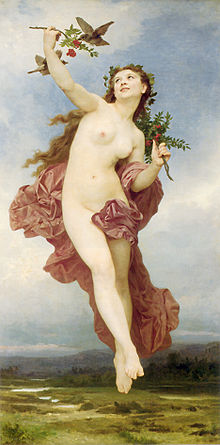Hemera
In Greek mythology, Hemera or Hémera (in ancient Greek Ἡμέρα Hēméra, 'day') was a primordial goddess (protogonos) and the female personification of the day. She was also called Amar (Αμαρ: 'day'). The Romans gave it the name Dies.
According to Hesiod, she was the daughter of Erebus (Darkness) and Nyx (Night). Cicero opines that Dies must logically be a god, if Uranus is one. The poet Bacchylides states that her parents were Nyx and Chronos, but Higino says in his preface to the Fables that he arose from Chaos and that Nyx was his sister. However, the most widespread myth considers that she is the daughter of Nyx and her brother Erebo.
Hemera was the female equivalent of her brother and consort of Aether (the Light), but neither figured actively in mythology or worship. According to Higino, she was a mother with Ether of Thalassa, the primordial goddess of the Mediterranean Sea; Broto, according to some mythographers.
As goddess of the day, Hemera came out of Tartarus just as Nyx entered it, and she came out again when Hemera returned.
where the Night and the Light of the day come closer and greet each other through alternatively the large bronze lobby. When one goes in, the other is already going to the door, and the palace never sits between its walls on both, but always one of them outside the palace lays round the earth and the other waits in the abode until the time of their journey.
Pausanias seems to confuse her with Eos when he says that she kidnapped Cephalus. Pausanias makes this identification with Eos after looking at the tiles in the royal portico of Athens, where the myth of Eos and Cephalus was illustrated. He makes that identification again in Amyclas and Olympia, after observing the statues and images in which Eos appears. (Hemera).
Contenido relacionado
Vulcan (mythology)
Lucifer
Apollo
Aphrodite
Astaroth
